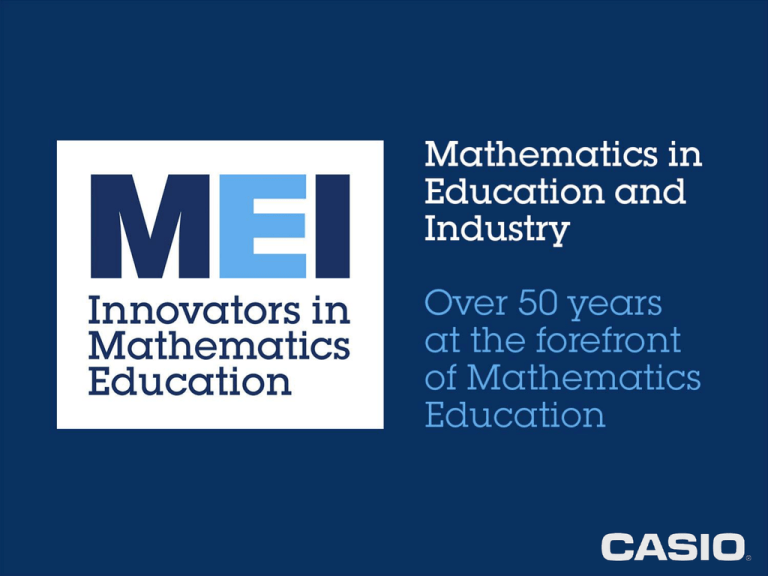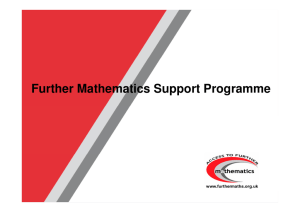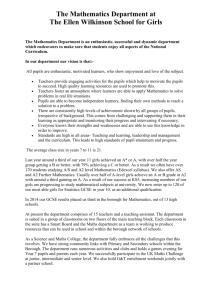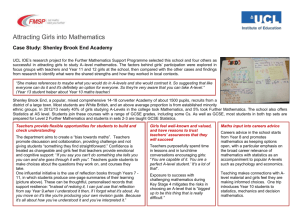Document 10489519
advertisement

Girls and Mathematics: Issues and Solutions Claire Baldwin, FMSP Central Coordinator MEI Session Outline • Provide a background to how gender interrelates with participation in A level Mathematics and Further Mathematics • Summarise recent FMSP and other research findings in relation to girls’ participation • Outline the current and planned future work of the FMSP in relation to gender • Offer a forum for discussion about gender and mathematics education The Further Mathematics Support Programme Our aim is to increase the uptake of AS and A level Further Mathematics to ensure that more students reach their potential in mathematics. The FMSP works closely with school/college maths departments to provide professional development opportunities for teachers and maths promotion events for students. To find out more please visit www.furthermaths.org.uk What are the facts about girls’ participation in Maths and Further Maths? Most popular A level subjects Most popular A level subjects 2014 A level entries by subject AS/A level Mathematics Entries 180,000 160,000 140,000 120,000 100,000 80,000 60,000 40,000 20,000 0 2003 2004 2005 2006 2007 2008 2009 2010 2011 2012 2013 2014 AS Mathematics A level Mathematics AS/A level Further Maths Entries 27,500 25,000 22,500 20,000 17,500 15,000 12,500 10,000 7,500 5,000 2,500 0 2003 2004 2005 2006 2007 2008 2009 2010 2011 2012 2013 2014 AS Further Mathematics A level Further Mathematics Girls’ Participation in other subjects 80.0 70.0 60.0 50.0 40.0 30.0 20.0 10.0 0.0 Facts and Figures – AS and A level 50 45 40 35 30 25 20 15 10 5 0 % A level Maths (Boys) % A level Maths (Girls) % A level FM (Boys) % A level FM (Girls) Facts and Figures – GCSE (2014) Mathematics “A feature of mathematics as experienced in education that is still pervasive is that one has to be the ‘best’ or achieve ‘top’ marks to continue” Qualified but not choosing STEM at University(2014) Facts and Figures - Progression • Progression rates to AS or beyond based on GCSE grade: • Only 3% of A level entries are from students progressing with below a grade B. • Unless they obtain an A* at GCSE, girls are much less likely than boys to continue with maths. Facts and Figures - Attainment English Boys English Girls Physics Boys A* A Physics Girls B C Further Maths Boys D E Further Maths Girls U Maths Boys Maths Girls 0 10 20 30 40 50 60 70 80 90 100 FMSP/IoE (and other) Research FMSP/IoE Literature Review • Prior attainment at GCSE is the single most significant predictor of continuing to A level. • Girls need to be inspired early in their secondary education • Variety of role models needed • Appropriate learning environment • Combinations of A level subjects FMSP/IoE Literature Review • Lower levels of self-concept in female students • OECD evidence agrees and notes differences in the application of mathematics: - 67% of boys but 44% of girls felt confident in calculating the petrol consumption rate of a car - 85% of boys but 75% of girls felt confident in calculating the price of a TV after a 30% discount - No gender differences in confidence were seen when tasks were abstract and matched classroom content, such as solving a quadratic equation. OECD: The ABC of Gender Equality in Education FMSP / IoE Case Studies • Four schools, one FE college that have already made excellent progress with girls’ participation in A-Level Maths/Further Maths. • Data collection: – quantitative data – focus groups of teachers and students – lesson observation – analysis by common factors and by matching to themes from the literature FMSP/IoE Case Studies KEY QUESTIONS: • How is girls’ participation in mathematics related to their prior attainment in mathematics? • Are there any intentional strategies addressing girls’ participation in mathematics or STEM recruitment more generally? How are these conceived, operationalised and evaluated? • Are there aspects of mathematics pedagogy that support girls’ selfconcept, enjoyment or interest in studying mathematics? • Are there aspects of careers or teacher guidance that support girls’ self-concept, enjoyment or interest in studying mathematics? • What messages are current in school culture about who does mathematics? FMSP/IoE Case Studies In the departments: • No specific initiatives aimed at girls • Promote the wide applicability of mathematics • Extension mathematics or additional qualifications • Influential female teachers • Parental support An aside on ‘maths capital’… ASPIRES – Young people’s Science and Career Aspirations, Age 1014 (2013), p 15 An aside on ‘maths capital’… The Campaign for Science and Engineering (CASE) report Improving Diversity in STEM (2014) p23 FMSP/IoE Case Studies In lessons: • Girls believed they were good at maths “I don’t think it’s about boys and girls, I think it’s about support to help you struggle and keep going – no-one can do that breakthrough moment for you, when you eventually find something that works. And then you feel so good about it – it’s like ‘I’m a genius’, even if I’m going to get stuck on the next question I try” (Year 12 student) • Teachers available for support informally • Girls felt teachers knew them as individuals FMSP/IoE Case Studies Maths journals: a department initiative that appeared to promote girls’ selfconcept. FMSP/IoE Case Studies Further Mathematics • Girls reported that schools promoted FM much less strongly than maths • Teachers described FM as for the ‘motivated core’ rather than a ‘clever core’. • View that FM is just ‘more of the same’ needs challenging. • SLT support is important • Medicine remains an issue FMSP Strategies FMSP Girls’ Webpages • Two FMSP website pages for female students and for teachers • www.furthermaths.org.uk/girls-maths (students) • www.furthermaths.org.uk/encouraginggirls-maths (teachers) - the FMSP/IOE Literature Review and Case Study reports can be accessed here FMSP Girls’ Participation Briefing Documents • Both accessible from www.furthermaths.org.uk/encouraginggirls-maths • Intended for Heads of Maths departments and senior leaders in schools and colleges • Summarises recent entry data by females • Outlines key messages arising from the literature review and case studies • Provides recommendations for Head of Mathematics Departments and school/college leaders to work to increase girls’ participation Current FMSP Initiatives • Work with Maths Hubs’ Post-16 Participation Working Groups to disseminate information. • The Working Groups might consider: - Reviewing existing practice using school data in their region Use focus groups with Year 10, 11 and 12 girls to understand what factors affect participation Survey parents on their awareness of the importance of A level Mathematics and Further Mathematics Develop specific action plans e.g. local mentoring schemes Future FMSP Activities • Produce leaflet for students and parents about A level Mathematics and Further Mathematics ensuring a balanced ‘girl friendly’ set of career profiles. • Incorporate the recommendations of case studies into teacher professional development courses and student enrichment events. • Potential collaboration with the IoP on joint projects relating to the investigation of girls’ participation. • Follow up in the case study schools / colleges to produce the final IoE report. Next steps… “… we can only be successful in getting girls, and women, into STEM if government, parents and teachers work together to engage and motivate girls.” For discussion…. • How can we get accurate messages about the importance of maths to senior leaders, pastoral staff and other colleagues advising young people about post-16 options? • How can MEI work with teachers to positively influence ‘Maths capital’, especially in areas of lower participation and for girls? • In what other ways could the FMSP work with other STEM/non-STEM organisations /university departments to promote greater uptake of post-16 Mathematics by girls? About MEI • Registered charity committed to improving mathematics education • Independent UK curriculum development body • We offer continuing professional development courses, provide specialist tuition for students and work with industry to enhance mathematical skills in the workplace • We also pioneer the development of innovative teaching and learning resources



